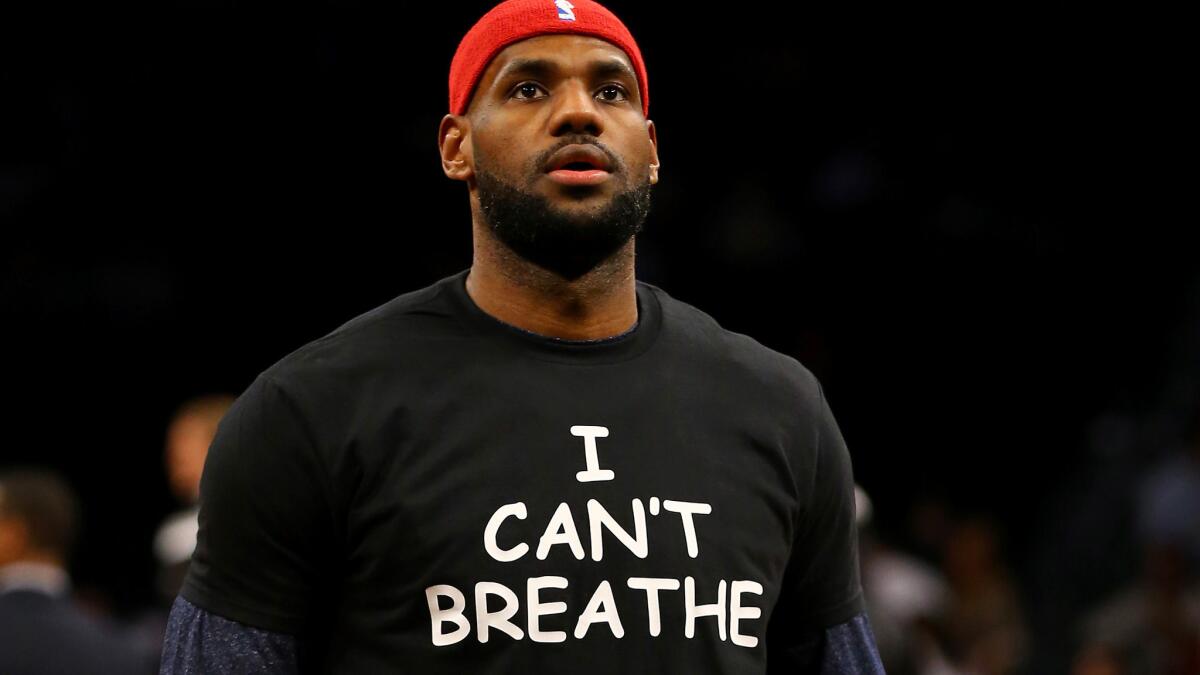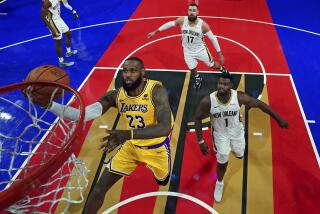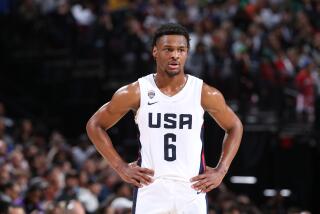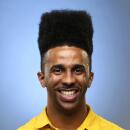Activists question LeBron James’ position in Tamir Rice protest

Cavaliers All-Star forward LeBron James wears an “I Can’t Breathe” shirt during warmups before a game a Dec. 8, 2014, in the aftermath of Eric Garner’s death.
- Share via
Some of LeBron James’ biggest fans want him to stop playing basketball for a while.
Using the hashtag #NoJusticeNoLeBron, a group of activists have been tweeting at the Cleveland Cavaliers star. Supporters of the hashtag say that James should sit out games to protest a grand jury decision to not indict two white Cleveland police officers who shot and killed Tamir Rice, a 12-year-old black boy who had a pellet gun.
Calls like this are not unusual. For a celebrity of color, fan expectations often exceed beyond the job description -- whether that job is acting, teaching literature, or throwing a ball through a hoop. Many must also deal with periodic calls to do something about, or at the very least comment on, racism or other injustice.
In a postgame interview Tuesday, James said that he wasn’t familiar with recent developments in Tamir Rice’s case. “I haven’t really been on top of this issue,” he said. “So it’s hard for me to comment.”
Reactions on social media were mixed, even among activists. Some thought James had no responsibility to take any political action. Others expressed disappointment that James, who had previously spoken about the deaths of Tamir Rice and Eric Garner, even going as far as to wear an “I Can’t Breathe” shirt in response to the latter case, did not take the opportunity to make a statement.
James is not the only person who has faced criticism in his response to the decision in Cleveland. When asked about the Rice case in an interview with ABC News, Republican presidential candidate Jeb Bush initially confused the case with another controversy, responding that “Chicago has a lot of work to rebuild trust.” When reminded that the case happened in Cleveland, Bush replied, “My bad,” and replied only in broad terms, speaking again about rebuilding trust.
However, as a presidential candidate, Bush is generally expected to be aware of and comment on political goings-on. This is not usually expected of athletes or other celebrities -- unless they are minorities.
Within communities that have limited representation in the media, this is often a point of controversy. If a celebrity can make a headline-grabbing public statement that spotlights an issue that affects their community, it can add a much-needed boost of attention. But, others question the reliance on big names to make social progress for minorities.
Tariq Touré is familiar with this controversy. A black writer and educator from Baltimore, Touré helped push the original call for James to sit out, and has been fielding messages of both criticism and support for his campaign all week.
A former athlete himself, Touré played football for Bowie State University in Maryland. When he saw the football players at Missouri organize a boycott in cooperation with campus protesters, he found it inspiring. Even before this, however, Touré says he has long been a proponent of the possibilities of activism for athletes. Last November, he hosted a summit on sports careers for local students, featuring topics ranging from football helmet design to team management, as well as talks by agents from the NBA and NFL. One of the panels was about the social responsibility of athletes.
As the discussion about a possible LeBron James protest circled online, one journalist observed on Twitter that people weren’t asking for Cleveland Cavaliers forward Kevin Love or owner Dan Gilbert -- both of whom are white -- to lead a boycott.
The phenomenon is not limited to questions of race, nor the sports world. In press interviews, male musicians usually aren’t asked to comment on sexism in the music industry, nor are straight actors expected to speak against homophobia in Hollywood. In general, celebrity representatives of marginalized groups are often expected to make statements that their peers may not.
Touré says he understands that a disproportionate pressure is often put on black athletes. But, he says, that “comes with the territory” of being a black athlete, and part of a society that has at times been pushed by high-profile figures such as Muhammad Ali, who famously refused the draft for the war in Vietnam. Because LeBron James is also from Ohio and has spoken out about police brutality in the past, he is in a perfect position to lead a boycott, Touré said.
Even if James does not stage a protest, Touré says he still appreciates his work, on and off the court. He was impressed by James’ 2014 pledge to fund four-year scholarships for students at the University of Akron. But he thinks that James could inspire even more young people -- many of whom might not think college is an option for them -- by protesting, and showing that he is concerned about their safety.
“I still love the man,” Touré said. “It’s going to be tough love, though.”
Follow me @dexdigi for more on the intersection of culture and the Internet
More to Read
Go beyond the scoreboard
Get the latest on L.A.'s teams in the daily Sports Report newsletter.
You may occasionally receive promotional content from the Los Angeles Times.











